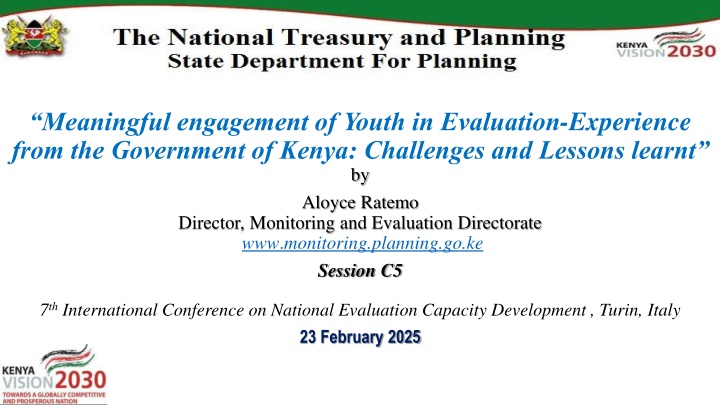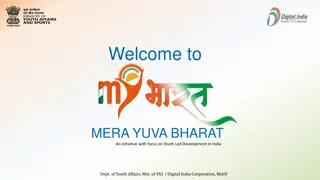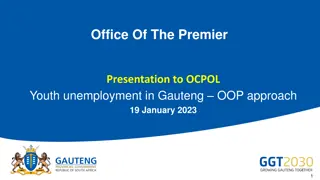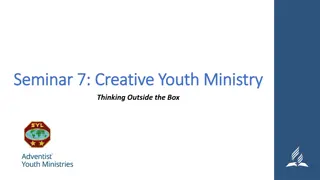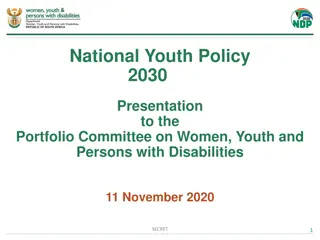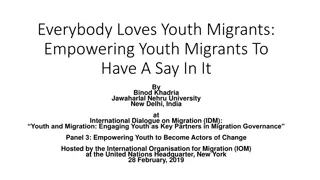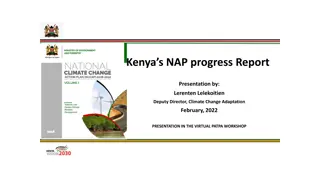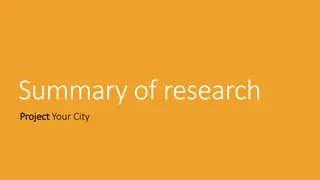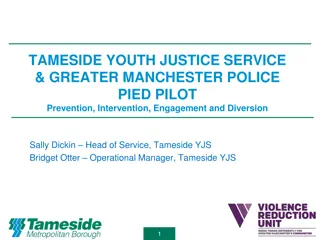Meaningful Engagement of Youth in Evaluation: Challenges and Lessons Learnt
Kenya has a youthful population, with significant challenges and lessons learnt in engaging youth in evaluations. Issues include inadequate knowledge and opportunities, insufficient logistical support, and limited employment prospects. Despite efforts, youth participation remains a hurdle. The government recognizes the importance of youth empowerment for development transformation.
Uploaded on Feb 23, 2025 | 1 Views
Download Presentation

Please find below an Image/Link to download the presentation.
The content on the website is provided AS IS for your information and personal use only. It may not be sold, licensed, or shared on other websites without obtaining consent from the author.If you encounter any issues during the download, it is possible that the publisher has removed the file from their server.
You are allowed to download the files provided on this website for personal or commercial use, subject to the condition that they are used lawfully. All files are the property of their respective owners.
The content on the website is provided AS IS for your information and personal use only. It may not be sold, licensed, or shared on other websites without obtaining consent from the author.
E N D
Presentation Transcript
Meaningful engagement of Youth in Evaluation-Experience from the Government of Kenya: Challenges and Lessons learnt by Aloyce Ratemo Director, Monitoring and Evaluation Directorate www.monitoring.planning.go.ke Session C5 7thInternational Conference on National Evaluation Capacity Development , Turin, Italy 23 February 2025
Outline Introduction; Challenges facing our youths; Lessons learnt while engaging the youth in evaluations; Conclusion.
Introduction Kenya is a very Youthful Country; According to the Kenya Population and Housing Census 2019: The Median age of the Kenya population is estimated at 19 years; 75% of the 47.6 million Kenya population is under the age of 35 years; The Youth population (18-34 years) constitute 29% (13,777,600) of the population; Article 260 of the Constitution of Kenya defines the youth as being individuals in the Republic who have attained the age of 18 years; but have not attained the age of 35 years.
Introduction.. Article 55 of the Constitution of Kenya, the State shall take measures, including affirmative action programmes, to ensure that the Youth: (a) access relevant education and training; (b) have opportunities to associate, be represented and participate in political, social, economic and other spheres of life; (c) access employment; and (d) are protected from harmful cultural practices and exploitation. The Government of Kenya recognizes the importance of youth engagement in development including implementation of theAgenda 2030 and its M&E processes; Youth Empowerment and Participation is an essential force for development transformation.
Challenges Inadequate knowledge, capacity and opportunity to engage and contribute significantly evaluations and development for transformation in Kenya; Insufficient logistical support: Although the Government has made attempts to empower the youth and ensure their participation through forums such as the annual M&E conferences, their participation has been minimal due to inadequate facilitation; Inadequate Employment opportunities: There are about 500,000 youth who graduate from various tertiary institutions yearly ready to enter the job market every year but only about 15% of them are successful in securing formal jobs.
Challenges. Digital divide Technology (ICT)- Youth especial those in the rural areas lack access to ICT services and hence are limited in exploiting their full potential in terms of career, business and education opportunities. in accessibility of Information and Communication Access to Financial Resources- Traditional financial institutions have avoided lending to youth due to their relative inability to comply with the high transaction costs, difficulty in assessing and managing their risk profile, and lack of the required financial documentation as well as collateral.
Lessons learnt Development of caring and skilled adults caring adults are a key element to any organization involving youth in evaluation. Adults can be resistant to viewing youth in new ways, letting them play new roles, giving them the space to have a voice in decision-making, and treating them as true partners. However, it is important to recognize that adults working with youth on evaluations also need training and support. This will ensure that the adults change the way to work with and look at youth. Meaningfully involving youth in evaluation process challenges adults to take on new roles themselves and to adapt the process to the needs and skills of the youth.
Lessons learnt. Establishment youth-adult( experienced evaluator) partnerships: These are very useful in promoting youth engagement. A partnership can provide youth with several adult mentors who may have a better understanding in evaluations. This has worked in Rapid Evaluations where we have one expert with the rest being internal staff. Even full scale evaluations where the lead consultants can partner with the young people to undertake an evaluation.
Lessons learnt Take Time to Build Trust- We need to allocate enough time to build trusting relationships between governments, other stakeholders and young people especially in evaluations. It is important to commit sufficient time, at all stages of evaluations right from design, development of ToRs, execution, reporting and presentation of the results.
Lessons learnt. Acknowledging that Learning Process - Youth engagement is a process rather than an outcome. Allowing young people to play equal roles in evaluation of an intervention may not always be possible or practical in particular if this is the first assignment. There is therefore need to recognize that they may have a limited knowledge hence need to continue learning to avoid unreasonable pressure on them; Young People s Participation in Evaluations is a Individuals or organizations who work with youth can achieve authentic and ongoing youth engagement but might need to be flexible and creative in how they engage youth;
Lessons learnt. Training and support : Providing the right training and support to youth is essential to the success of youth involvement in evaluation activities. The Government of Kenya has provided the youth emerging from Universities with an opportunity to learn from government as well as provide their own knowledge through the 1-year internship and 3-month attachment programmes. The Government initiated placing of Evaluation Course in local universities both public and private. So far, more than 10 universities are offering M&E courses at Masters level and/or as a Post Graduate Diploma. This has ensured consistent supply of YEEs every year to close the capacity gap.
Lessons learnt. Tapping on the youth enthusiasm - Youth demonstrate high levels of active participation given space and not controlled by adults. They are willing to work with others while also taking on leadership roles. They feel a sense of belonging and are therefore at ease in sharing their ideas, while welcoming the opinions of others. They are more productive compared to staff who have stayed in office for decades and are nearing retirement.
Conclusion The Youth are, and will remain, a significant share of Kenya's population for the foreseeable future; Developing and implementing appropriate strategies, policies and programmes to mitigate the risks and challenges the Youth face continue to be of a priority for the Government; Failure to provide appropriate opportunities for this large segment of the population could have enormous economic, political, cultural, and social consequences; Engaging the Youth population fully is therefore no longer a choice but an imperative in the development process.
Young people are our future and they must stand for themselves, as the future of Kenya stands with them. Thank You! Questions
